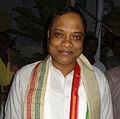Odisha Pradesh Congress(INC) | |
|---|---|
 | |
| President | Bhakta Charan Das |
| Chairman | Rama Chandra Kadam |
| Headquarters | Congress Bhawan, Unit-2, Bhubaneswar -751009, Odisha |
| Student wing | National Students' Union of India - Odisha |
| Youth wing | Odisha Youth Congress |
| Women's wing | Odisha Pradesh Mahila Congress Committee |
| Ideology | |
| ECI Status | A State Unit of Indian National Congress |
| Seats in Rajya Sabha | 0 / 10 |
| Seats in Lok Sabha | 1 / 21 |
| Seats in Odisha Legislative Assembly | 14 / 147 |
| Election symbol | |
 | |
| This article is part of a series on the |
| Indian National Congress |
|---|
 |
The Odisha Pradesh Congress Committee is the unit of the Indian National Congress for the state of Odisha. It is responsible for organizing and coordinating the party's activities and campaigns within the state, as well as selecting candidates for local, state, and national elections in Odisha.
Contents
- List of district congress committee presidents
- History
- Pre-Independence 1920-1947
- List of presidents
- Electoral performance
- Odisha Legislative Assembly election
- Lok Sabha elections
- Political affairs committee
- See also
- References
- External links
The head office of the organisation is the Congress Bhawan, situated at Master Canteen circle in Bhubaneswar.
Bhakta Charan Das was appointed president of the committee in 2025 following the 2024 general elections and currently serves as the Odisha Pradesh Congress Committee(OPCC) President. [1] [2] [3] [4] [5] [6] [7]
The house and floor leader of the Odisha Pradesh Congress Committee MLA cohort is Rama Chandra Kadam (Congress Legislative Party Leader) along with deputy Congress Legislative party leader Ashok Kumar Das elected from Pottangi and Basudevpur respectively into the Seventeenth Assembly of the legislature. Currently the state unit has only one elected Member of Parliament in the Lok Sabha who is Saptagiri Sankar Ulaka having been elected twice consecutively.
The current Social Media Department of the Odisha Pradesh Congress Committee is also Chaired by a elected tribal lawmaker Satyajeet Gomango & co-chaired by former Zilla Parishad candidate Santosh Pradhan and is purviewed by a national co-coordinator of the AICC Department of Social Media & Digital Platforms & Assets Dr Sumit Dubey. [8] [9]








